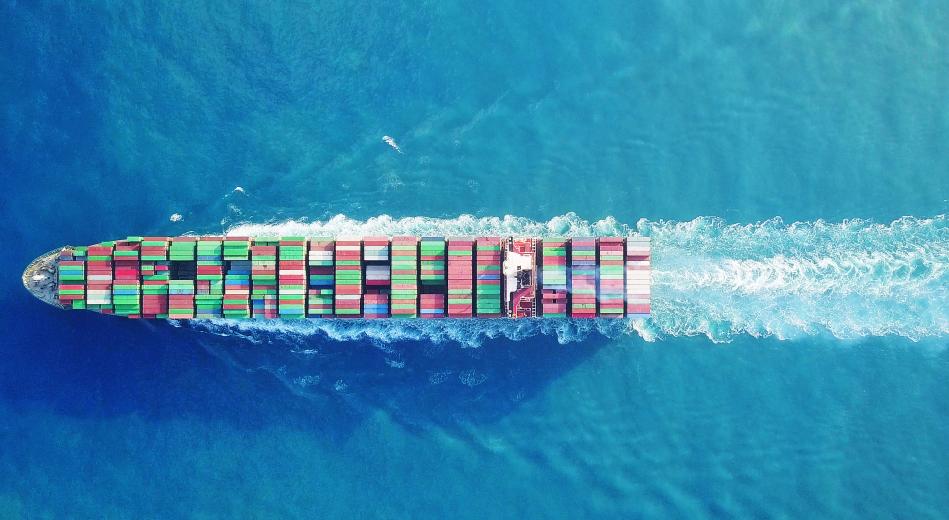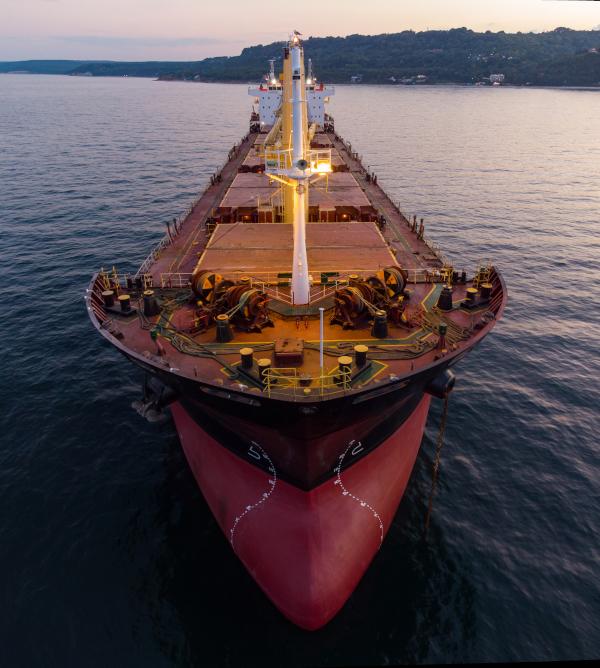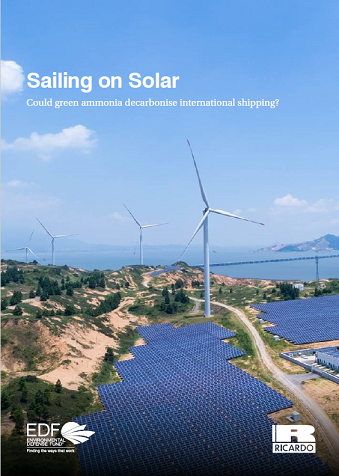
There is no doubt that alternative fuels will play a crucial role in the transition of international shipping. To decarbonise, the industry will need to adopt zero-carbon technologies. For us at EDF Europe, alternative fuels are one of the main topics related to shipping. We have been looking at different fuels and assessing opportunities their implementation would bring to countries and their economies.
Sustainable first movers

In November 2023 we introduced the Sustainable First Movers Initiative Identification Tool in cooperation with Lloyd’s Register, a global professional services organisation specialising in engineering and technology solutions, and Arup, a group of international professionals dedicated to sustainable development.
This tool, presented in a preliminary findings report – The potential of ports in developing Sustainable First Mover Initiatives: A tool for an inclusive shipping transition – is designed to help shipping stakeholders align investment decisions that support the maritime energy transition away from fossil fuels. It scores a port’s potential to produce and bunker electrofuels while delivering local environmental and community benefits in alignment with the global temperature target of 1.5 degrees Celsius set by the Paris Agreement.
With close to two billion people living near coastal zones globally, the role of, and impacts on local port communities must be intentionally considered as the sector decarbonizes globally. Ports can play a crucial role in ensuring shipping decarbonisation efforts are done in a way that has positive impacts on port communities. The preliminary phase this tool analyzes 108 ports in the Indo-Pacific region according to five criteria including land suitability, air quality, renewable energy surplus, economic resilience and ship traffic.
The next phase of this work will involve a more comprehensive analysis in partnership with local shipping stakeholders and will include the selection and assessment of 10 ports to help better understand local needs and maximise the value offered by sustainable first mover initiatives.
For more information download the full report.
Ammonia at sea

Ammonia at sea: studying the potential impact of ammonia as a shipping fuel on marine ecosystems
In November 2022 we published Ammonia at sea: studying the potential impact of ammonia as a shipping fuel on marine ecosystems in cooperation with the global sustainability consulting firm Ricardo and Lloyd’s Register, a global professional services organisation specialising in engineering and technology solutions. The report analyses the challenges presented by the introduction of ammonia as a shipping fuel related to safe fuel bunkering, storage, supply and consumption for different ship types, as ammonia is toxic if released into the environment.
The report, focused specifically on the impacts of acute large-event spills of ammonia used as a shipping fuel that can occur during bunkering or in the case of a ship’s collision and sinking, assesses the consequences for ecological receptors in riverine, transitional and marine habitats where a spill may occur. The habitats assessed were rivers, estuaries, wetlands, coastal waters, coral reefs, mangroves, polar regions and the deep sea. The impact on ecological receptors within each aquatic habitat were also considered.
Ammonia produced from renewable energy sources is considered a sustainable fuel alternative. But it's crucial the shipping industry proceed with caution because the potential impacts of ammonia as a fuel on aquatic environments need to be further identified and assessed.
For more information see our report summary or download the full report.
Electrofuels for shipping
In December 2019 we published a new study Electrofuels for shipping: How synthetic fuels from renewable electricity could unlock sustainable investment in countries like Chile. The report, which was created in cooperation with the global sustainability consulting firm Ricardo, analyses electrofuels, namely green ammonia, hydrogen and methanol made with untapped renewable energy, as a tool to decarbonise international shipping. These climate-friendly fuels can be produced to scale using commercially available technologies, and deployed at scale relatively quickly.
The report, focused specifically on potential implementation of these fuels in Chile, which has one of the world's largest renewable energy capacity that currently remains mostly unused. Chile is a major maritime nation which, thanks to its remote position, heavily relies on seaborne trade. Chile's geographic setting makes it possible to place electrofuel plants close to ports and main shipping routes.
Introduction of electrofuels in Chile could unlock investment worth up to 90 billion US dollars and would bring many other benefits to the country and its people.
For more information see our blog or download the full report.
Sailing on Solar

Sailing on Solar: Could green ammonia decarbonise international shipping?
In May 2019, we published a report Sailing on Solar analysing the application of green ammonia (i.e. ammonia made with renewable energy) in international shipping. The report, prepared by global sustainability consultancy Ricardo Energy and Environment, identified green ammonia as one of the most promising zero-carbon shipping fuel options. Green ammonia can offer a climate solution if it can be produced at scale using abundant untapped renewable energy resources without increasing fossil fuel use, and can be used in modified shipping engines and hydrogen fuel cells. Moreover, the authors concluded that wider adoption of such a fuel can unleash trillions of dollars of investment opportunities in sustainable industrial infrastructure, particularly in developing countries.
The paper also analysed issues around the potential supply of green ammonia – such as the construction of production plants and infrastructure – as well as the demand from the vessels themselves, including fuel transport and engine compatibility. The study demonstrates that countries with untapped renewable energy potential could benefit by establishing a green ammonia supply chain for the marine sector.
This is shown in a case study of Morocco where green ammonia production could be developed using its abundant renewable energy capacity. In addition, Morocco’s large commercial ports near important shipping lanes make the country well-suited to foster a green ammonia industry. This capacity can be used to attract investment in Morocco for renewable energy and green ammonia that otherwise would not happen.
More information about the report can be found in this blog, alternatively the full report is available for download.
Webinar
At the end of July 2019, we partnered with Ricardo once again to make the Sailing on Solar paper accessible to a wider audience. We ran two webinars presenting the main findings of the report as well as policy solutions for decarbonisation of the shipping sector which you can watch by clicking below.
At the end of July 2019, we partnered once again with Ricardo to present the conclusion of our Sailing on Solar report to a wider audience in the form of a webinar.
How about other fuels?
Alternative fuels will be needed not only to meet (and hopefully exceed) the International Maritime Organisation's target to reduce greenhouse gas emissions by at least 50% by 2050 compared to 2008 levels. They will play also an important role in helping the industry to meet criteria for the 2020 sulphur cap. Green ammonia is certainly not the only solution for zero-carbon shipping and its share in the future fuel mix will depend on a wider range of factors. We have analysed other low or zero carbon fuel options for the shipping industry and created a simple overview of the main findings here.
